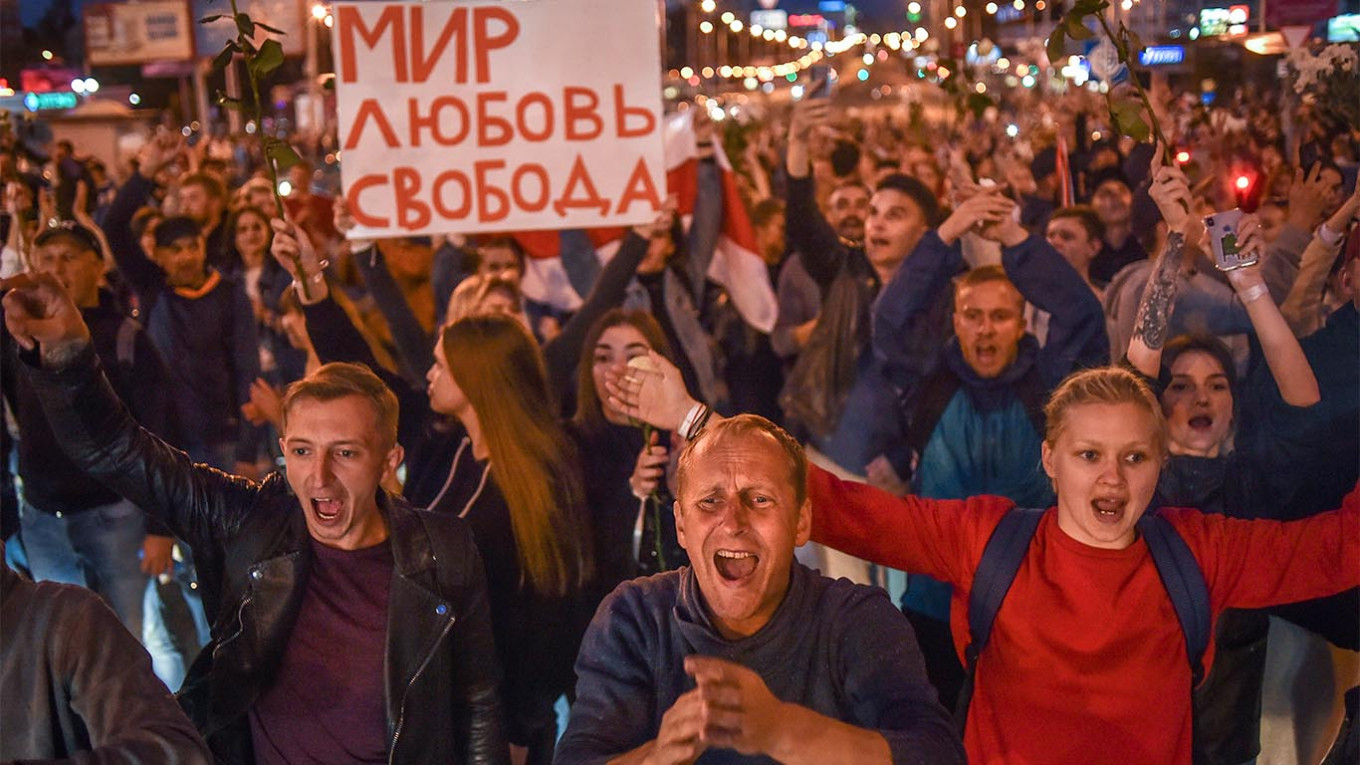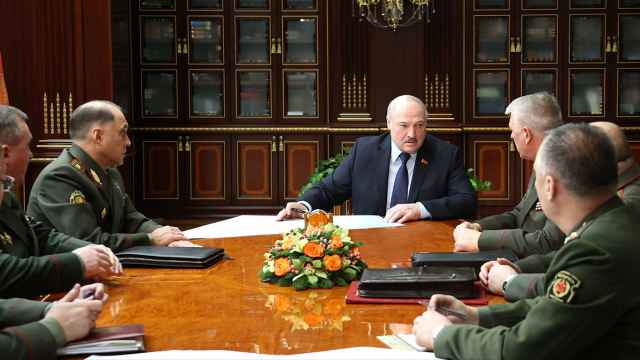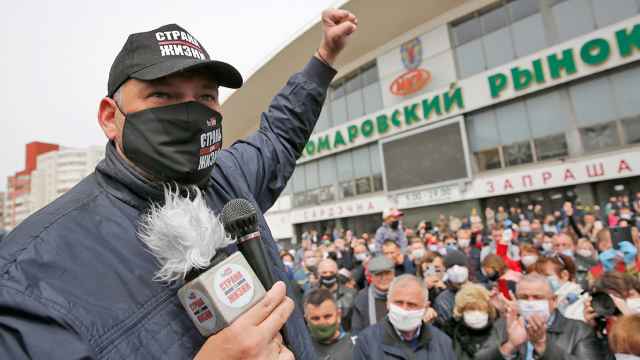Tens of thousands of Belarusians staged a wave of peaceful protests on Thursday against President Alexander Lukashenko's disputed re-election and an ensuing brutal police crackdown.
In apparent concessions, Belarus announced the release of more than 1,000 detained protesters and the interior minister apologized to injured bystanders.
European countries condemned the police violence, with the European Union set to discuss possible sanctions on Friday.
Crowds stood on central streets in the capital Minsk waving lit-up phones and flowers, and cheering as cars drove past honking horns in support.
Earlier tens of thousands of people formed human chains in the city, many wearing white and holding flowers and balloons, to protest against police brutality during four nights of unrest since Sunday's vote.
Similar human chains formed in half a dozen other cities, local media reported.
Official statements suggested a more conciliatory approach following public outrage at extreme police violence including shootings and beatings.
Senate Speaker Natalya Kochanova said on television that Lukashenko had ordered officials to review detentions and more than 1,000 people taken into custody at protests had been released.
AFP journalists saw men and women emerge from a Minsk detention center.
The interior ministry has said it has detained some 6,700 people at protests since Sunday.
Interior Minister Yury Karayev said on state television: "I apologize for the injuries of random people at protests who got caught in the middle."
Lukashenko's opponents accuse him of rigging the election to defeat his main rival, popular opposition candidate Svetlana Tikhanovskaya, who has left the ex-Soviet country for neighboring Lithuania.
People came out to contest the election results and police used stun grenades, rubber bullets, tear gas, water cannon and, in at least one case, live fire to disperse the crowds.
At least two people have died and hundreds have been wounded in the violence while nearly 7,000 have been arrested.
V signs as women freed
Outside Minsk's Okrestina detention center, women detainees emerged first in small groups then male detainees, as hundreds of friends and relatives waited.
Many of the detainees looked tired and tearful but some raised V signs and punched the air.
Volunteers handed out food and blankets and offered rides home.
The constitutional court has so far released 569 names of people sentenced to brief jail terms, usually 15 days.
Amnesty International said detainees had testified that they received severe beatings and threats of rape.
Those detained have said they were held in overcrowded cells with insufficient food and water.
'Change!'
On Thursday, demonstrators held placards reading "Change!" and "No violence" and wore white bracelets, one of the symbols of the opposition movement.
"We want to show that we, the women of our country, are against violence," said Yekaterina, a 38-year-old hairdresser wearing a white sweater and jacket and holding a bunch of white flowers.
Large groups of workers at several major factories staged walk-outs, local media reported.
Russia's Foreign Ministry on Thursday claimed protests showed "clear attempts at outside interference."
But leaders of neighboring Poland and the Baltic states urged Lukashenko to "terminate the use of force against your people immediately."
European Union foreign ministers were set to discuss possible new sanctions on Belarus at an extraordinary meeting on Friday.
Prominent Belarusians have condemned the violence and urged Lukashenko, who has ruled Belarus with an iron grip since 1994, to step down.
In an interview with RFE/RL, writer Svetlana Alexievich, winner of the 2015 Nobel literature prize, spoke of her shock at the "inhumane, satanic" actions of riot police and urged Lukashenko to go peacefully.
'Inhumane actions'
The interior ministry on Wednesday acknowledged that police deliberately fired on a group of protesters, wounding one.
Officials have confirmed the deaths of two protesters.
Police said the first died on Monday when an explosive device went off in his hand, while his widow told local media he was unarmed.
The Belarusian Investigative Committee, which probes major crimes, on Wednesday said a 25-year-old man died after being detained and sentenced to 10 days in prison in the southeastern city of Gomel.
His mother told local media he had heart problems and had gone out to see his girlfriend, not to take part in protests.
Foreign-controlled 'sheep'
The protests broke out after authorities said Lukashenko won 80% of the vote in Sunday's election to secure a sixth term.
Lukashenko, 65, has dismissed the demonstrators as foreign-controlled "sheep."
The protest movement arose in support of Tikhanovskaya, a 37-year-old political novice who ran for president after potential opposition candidates including her husband were jailed.
The official results gave her 10% of the vote, but Tikhanovskaya said the election was rigged and claimed victory, demanding that Lukashenko hand over power.
She left for neighboring Lithuania on Tuesday as allies said she came under official pressure.
A Message from The Moscow Times:
Dear readers,
We are facing unprecedented challenges. Russia's Prosecutor General's Office has designated The Moscow Times as an "undesirable" organization, criminalizing our work and putting our staff at risk of prosecution. This follows our earlier unjust labeling as a "foreign agent."
These actions are direct attempts to silence independent journalism in Russia. The authorities claim our work "discredits the decisions of the Russian leadership." We see things differently: we strive to provide accurate, unbiased reporting on Russia.
We, the journalists of The Moscow Times, refuse to be silenced. But to continue our work, we need your help.
Your support, no matter how small, makes a world of difference. If you can, please support us monthly starting from just $2. It's quick to set up, and every contribution makes a significant impact.
By supporting The Moscow Times, you're defending open, independent journalism in the face of repression. Thank you for standing with us.
Remind me later.






